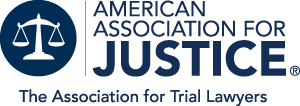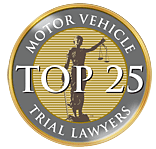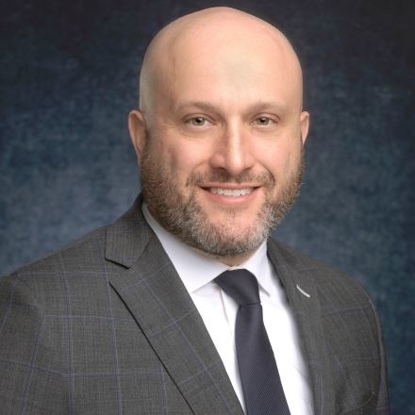
Norfolk Car Accident Attorneys
Fighting For Car Accident Victims in Virginia
According to the Virginia Department of Motor Vehicles and Virginia Highway Safety Office, there were 118,498 auto accidents throughout the commonwealth in 2021. Of these accidents, more than 4,000 occurred within the jurisdiction of Norfolk City, resulting in 2,253 injuries and 28 fatalities.
Sadly, these statistics are not uncommon. Every year, thousands of Virginians are injured or killed in motor vehicle accidents—and most of these accidents are entirely preventable. If you were injured or if your loved one passed away due to a car accident, and you believe someone else may be at fault, reach out to Kalfus & Nachman PC right away. Our Norfolk car accident attorneys can help you determine if you have grounds for a personal injury or wrongful death claim. We are ready to fight tirelessly for you.
On This Page:
- Common Car Accident Injuries
- Common Causes of Car Accidents
- Determining Fault in Your Car Accident Claim
- Damages in Car Accident Claims
- Insurance & Car Accidents
- What to Do After a Car Accident
- Car Accidents in Another State: What Happens Next?
- Process for Filing a Car Accident Claim
- Choosing a Car Accident Attorney
- How Our Car Accident Lawyers Can Help You with Your Claim
- Navigating Norfolk's Busy Roads
- FAQs About Car Accident Claims in Norfolk
Contact us online or call our office at (855) 880-8163 to schedule a completely free consultation with our car accident attorney in Norfolk.
Common Car Accident Injuries
Car accidents are among the leading causes of serious, catastrophic injury and death in the United States.
Some of the most common types of injuries resulting from car accidents include:
- Broken bones/bone fractures
- Bruises, contusions, abrasions, and lacerations
- Head, shoulder, and neck injuries
- Soft tissue injuries
- Spinal cord injuries
- Traumatic brain injuries
- Traumatic amputation
- Whiplash
These and other car accident-related injuries can have a serious impact on the victim’s life, as well as the lives of their loved ones. By filing a personal injury claim, the victim can seek fair compensation for their injury-related damages so that they can begin to heal.
Beyond the physical harm, these injuries often lead to extensive emotional and financial stress due to mounting medical bills, lost income, and the need for ongoing rehabilitation. Victims may also experience long-term disabilities that require significant lifestyle adjustments. It is crucial to recognize these broader impacts as they play a vital role in determining appropriate compensation. Legal guidance becomes essential to navigate the complexities of insurance policies and to ensure that victims receive comprehensive support during these challenging times.
Common Causes of Car Accidents in Virginia
Car accidents can be caused in any number of ways. At the root of nearly every car accident, though, is one common problem: negligence. When another motorist or party does not prioritize safety, it always puts others in danger, and it often results in a car accident that wouldn’t have happened otherwise.
In Virginia, car accidents are most often caused by:
- Driver distraction: A distracted driver is a highly dangerous one. Using a smartphone to text or watch videos, adjusting or listening to GPS directions, talking with a passenger, eating, and applying makeup are all common types of driver distractions.
- Driver intoxication: Nationwide, drunk drivers cause hundreds of car accidents every day and night. Virginia is no exception.
- Reckless driving: Speeding, tailgating, unsafe lane changes, and speeding up at yellow lights instead of slowing down are among the most commonplace forms of reckless driving.
- Auto part defects: If an auto part becomes defective or fails without warning, it can cause even the most responsible motorist to lose control and crash.
- Unsafe road conditions: In some car accident investigations, it is revealed that unsafe and unacceptable road conditions caused a motorist to get into an accident, sometimes with no other vehicles involved. When this happens, the municipal agency in charge of maintaining the roads might be liable.
Understanding the root causes of car accidents can aid in prevention and prepare individuals to take a stand when seeking compensation. Additional factors like sleep deprivation and poorly-maintained vehicles also contribute to accidents and underscore the importance of education and maintenance. Vehicle manufacturers and local governments have a role in ensuring safer roads, while drivers must remain vigilant and informed about defensive driving techniques. By identifying these causes, individuals in Norfolk can better protect themselves and others on the road.
Determining Fault in Your Virginia Car Accident Claim
Virginia is one of very few states to still follow the strict rule of contributory negligence. Under this rule, you may not recover compensation after an accident for which you were even minorly at fault. If the insurance adjuster argues that you were just one percent to blame, you could be barred from recovering compensation for your injuries and related damages. For this reason, it is extremely important that you work with an experienced Norfolk car accident attorney to prove the fault of the other driver (or another third party).
To determine fault in your car accident claim, our team may:
- Work with accident reconstruction experts to determine how the crash occurred
- Evaluate evidence from the scene of the accident, such as tire marks
- Get your account of what happened and talk to any eyewitnesses who saw the crash
- Review images or video footage (if available) from the crash
- Engage in the testimony of expert witnesses in this area
We know how to build powerful, evidence-based claims for our clients. Our meticulous approach to case preparation and our aggressive client advocacy have helped us recover millions of dollars in settlements and jury verdicts.
Understanding contributory negligence is essential, as it is a unique aspect of Virginia's legal landscape. Such laws stress the significance of gathering extensive evidence and require a strong legal strategy to ensure the accountable party is held responsible. Our comprehensive approach involves not only physical evidence but also digital data, such as vehicle telemetry and smartphones, which offer increasingly critical insights into pre-accident conditions and decisions. Partnering with our legal team ensures that you have a trusted advocate who leverages every tool to support your claim.
Who Is At Fault in a Car Accident?
The “at-fault” party in a car accident is the party that caused or contributed to the circumstances that led to the crash. The legal term is the “liable” party, and the commonplace term is the party that “is to blame.” As mentioned above, our Norfolk car accident attorneys can look for evidence to prove who is at fault because your word against the at-fault party’s word likely won’t be enough.
When we file a car accident claim, the defendant is usually another motorist, but it can be an automaker or another third party, depending on the details of the claim. Also, it is typical that the defendant is represented by an insurance company and its defense team, so don’t be surprised if more than the defendant shows up to meetings, hearings, and courtroom sessions.
Navigating Norfolk's Busy Roads
Norfolk is known for its vibrant urban life and significant naval base, which contribute to the heavy traffic on local roads. Key arteries such as Interstate 64, Granby Street, and Tidewater Drive are often congested, especially during rush hours and peak seasons when tourists flock to the region. Understanding the flow of traffic and common traffic patterns is crucial for avoiding accidents. Observing traffic signals and speed limits, especially around bustling areas like MacArthur Center and the Norfolk Naval Base, can significantly reduce your chances of being involved in an accident.
One of the ongoing challenges for drivers in Norfolk is the network of tunnels connecting the Hampton Roads area. These include the Downtown Tunnel and Hampton Roads Bridge-Tunnel, which are susceptible to traffic bottlenecks and weather-related disruptions. Knowing alternate routes and staying updated on traffic alerts can be invaluable for smooth travel. Local initiatives often focus on improving road safety and infrastructure, aiming to accommodate the growing population and vehicular demands of the region.
Can I Still File a Claim If I Was Partially at Fault?
Under Virginia's contributory negligence law, if you are found to be even slightly at fault, you may be barred from recovering any damages. This law differs from those in other comparative negligence states, making it vital to have a clear and strong argument establishing the other party's blame. Legal guidance is crucial in these situations to protect your rights and ensure due diligence in proving fault lies elsewhere.
Do I Need a Lawyer for My Car Accident Claim?
While it is possible to file a claim independently, having a lawyer significantly increases the likelihood of a favorable outcome. An experienced attorney not only navigates the legal complexities but also ensures that you receive fair compensation. From handling paperwork to negotiating with insurers, a lawyer’s expertise in the nuances of Virginia’s accident laws can be invaluable, particularly in disputes over fault or compensation amounts.
While a successful car accident claim can help you feel like a sense of justice was fulfilled, the main purpose of any injury claim is to get compensation for the injured party/plaintiff/claimant. The compensation in your case should reflect how much you have lost and struggled due to the defendant’s negligence which led to the crash. Furthermore, in legal contexts, compensation can be broken down into different types of “damages.”
Common damages that might apply to your car accident claim include:
- Past and future medical expenses
- Past and future pain and suffering
- Past and future lost income/wages
- Loss of earning ability/inability to obtain gainful employment
- Lessened enjoyment of life/shortened life expectancy
- Miscellaneous out-of-pocket expenses associated with the accident
The potential value of your claim depends on the total value of your damages. In theory, the worse you were injured in a car accident, the higher the value or “worth” of your claim (but this is not guaranteed).
Though rare, punitive damages might also be recoverable in a car accident lawsuit that goes to trial. If the court determines that the defendant with gross negligence, egregious misconduct, or malicious intent to cause injury, it might approve or assign punitive damages meant to punish the defendant rather than compensate the plaintiff. Again, punitive damages are very rare, so they might not apply to your case.
Insurance & Car Accidents in Virginia
In Virginia, all motorists must carry car insurance with the following minimum coverage amounts:
- Bodily injury or death of one person: $25,000
- Bodily injury or death of two or more people: $50,000
- Property damage: $20,000
If you do not have insurance, you must pay a $500 Uninsured Motor Vehicle (UMV) fee to the DMV every time you renew your vehicle registration. This fee does not provide you with any insurance coverage; it only allows you to legally drive an uninsured car at your own risk.
Anytime you are involved in a car accident, you must report it to your insurance company as soon as possible. Although you’d think that the insurance company will pay you what you are owed as an accident victim, this is rarely the case. In fact, without an experienced Norfolk, VA car accident attorney on your side, you will most likely be offered a mere fraction of the compensation you are truly entitled to.
Insurance companies will look for any excuse to minimize or deny your claim, using various tactics to avoid payment, such as:
- Making an early settlement offer that is much less than you deserve
- Suggesting your injuries were not from the car accident
- Saying you were at fault for the car accident
- Downplaying your injuries
- Hiding the fact that you are owed additional applicable coverage
- Delaying negotiations for so long that you give up and accept their meager settlement
Before you accept any kind of payment offer from an insurance company, consult with one of our experienced Norfolk car accident lawyers. We can help you determine the true value of your claim.
Hiring a car accident attorney in Norfolk does not necessarily mean your claim will go to court. In many instances, insurance companies will bend as soon as they discover you have an attorney on your side. At Kalfus & Nachman PC, we know how to effectively negotiate with insurance companies and fight for your right to fair compensation. We will calculate the full amount of damages you are entitled to and we won’t back down until you receive a settlement, or a verdict, that is in your best interest.
What to Do After a Car Accident in Norfolk, Virginia
If you are involved in a car accident, the most important thing is to remain calm. You may be disoriented, even if you did not lose consciousness. If anyone involved in your motor vehicle accident is injured, you should call an ambulance (9-1-1). If there are no injuries, here are some things you should do:
- Contact the police. Officers will take statements and investigate the way each vehicle came to rest to piece together what happened. They will want witness testimony, so if anyone saw the accident, be sure to get their contact information so the police can call them later. Remain at the scene of the accident until the police have come and gone. Make sure you write down the name of the officer who took your report. Also, write down your version of what happened while it is fresh in your mind.
- Don't admit fault. Never admit fault to anyone; not the other party and not the police. However, be sure not to fabricate the truth no matter how embarrassing. If you change your story later, this may hurt your ability to win damages.
- Take notes, and more. If the car accident is minor and there are no injuries, the police may not arrive on the scene. If this is the case, it is your responsibility to document the scene. Take photographs with a camera or cell phone and write a detailed recollection of how the accident occurred. Be sure to photograph any pertinent obstructions, weather conditions, debris or landscape that may have impacted your accident.
- Conduct interviews. Gather the names, addresses, driver's license, and insurance information with every other driver. Also, write down the names and contact information of any witnesses and passengers involved.
- Review your insurance policy to see what it covers. Carefully review the “declarations” page, which lists the types and dollar limits of your coverage. Pay close attention to any discounts or special provisions that you have purchased, and make a list of questions for a car accident lawyer.
Emergency Kit to Keep in Your Vehicle
It is a good idea to keep an emergency kit in your vehicle in case of an accident. Your kit should contain:
- A pen and paper for taking notes
- A disposable camera to take photos of the vehicles at the scene
- A card with information about medical allergies or conditions that may require special attention if there are serious injuries
- A list of contact numbers for law enforcement agencies
- A flashlight to assess damage at night
- A set of cones, warning triangles or flares to warn other drivers if you cannot move your vehicle quickly off the road
Car Accidents in Another State: What Happens Next?
A vast majority of insurance companies extend coverage all across the US and even Canada, but double-check with your provider to be sure.
The tricky part comes if and when an injury has occurred. That's because several states (and Washington, DC) have a “no-fault” policy when it comes to car accidents, meaning injured drivers draw from their own insurance first after an accident. Those states are:
- Florida
- Hawaii
- Kansas
- Kentucky
- Massachusetts
- Michigan
- Minnesota
- New Jersey
- New York
- North Dakota
- Pennsylvania
- Utah
- The District of Columbia
That means no matter who's at fault, your accident is paid for by your insurance. The only exception is if someone sustains a very serious injury. In addition, some states have varying degrees of shared liability in accidents that can reduce or negate your compensation for damages.
Pure comparative fault states allow you to collect damages proportionate to your total fault in the accident—meaning you'd receive $1,000 in damages if your total costs were $2,000 and you were 50% responsible for the accident.
Likewise, you'd receive $500 out of $2,000 if the accident was 75% your fault.
In modified comparative fault states, you may only collect damages if your are less than 50% responsible.
And in states who follow contributory negligence, anyone partially at fault for the accident is unable to collect damages.
Also, be mindful of the statute of limitations in each state you are traveling to (meaning how long you have after an accident to file a lawsuit). Most states allow claims up to a year after an accident, but this number may vary.
Process For Filing a Car Accident Claim in Virginia
Unfortunately, many people who have been hurt in a car accident never explore their legal options because they’re worried the process of filing a claim will be too much work. What they don’t realize is that the stress and complications of filing a car accident claim in Virginia can be eliminated just by putting our attorneys in charge of the case. We are here to handle every step of your car accident claim, so you can stay focused on other parts of your life like resting and being with your family.
From start to finish, we can handle all processes for your car accident claim, such as:
- Investigating the accident to look for evidence of liability.
- Calculating damages owed to you based on your losses and injuries.
- Sending a letter to demand compensation.
- Preparing and filing a lawsuit if no compensation is provided.
- Attempting settlement negotiations to avoid litigation.
- Representing you in court if a lawsuit is necessary.
How to Choose a Norfolk Car Accident Attorney
If you were injured or a loved one was killed in a car accident in Norfolk, VA, you may be overwhelmed, frightened and confused as to what to do next. Even though you have suffered a traumatic event, it is important to consider legal matters that may affect the rest of your life.
If you were injured and cannot go back to work, you will need money to pay the bills and take care of yourself and your family. For this reason, it is crucial to choose a Norfolk car accident attorney who will give you individualized attention and work diligently to get you the financial compensation you need and deserve to cover the expenses resulting from the car accident.
If you are looking for a Norfolk car accident lawyer, the best place to start is by contacting the local Bar Association in your area. The Bar Association maintains a list of responsible attorneys and will be able to recommend a good personal injury lawyer to you.
You can also:
- Ask friends and family if they know of a good law firm
- Look at websites of local attorneys
- Schedule consultations with a few different firms
- Ask about the law firm's success with cases similar to yours
- Ask about the lawyers' experience and education
You should feel you can trust the lawyer you choose. During your initial consultation, the attorney should make you feel like your claim is as important as anyone else's. The lawyer you consult with should explain how the claim will be handled and explain to you whether or not you have a valid car accident claim.
Regardless of how you find your car accident attorney, make sure that he or she puts you at ease, listens to your needs and seems sincere about trying to help you. Before doing anything, your personal injury attorney should listen carefully to your account of what happened, taking detailed notes and then suggesting a course of action. Sometimes a lawsuit is not the appropriate response to an injury, and your injury attorney should not only be able to admit that to you but also be able to suggest alternative solutions.
How Our Car Accident Lawyers Can Help You with Your Claim
At Kalfus & Nachman PC, we help our clients with every aspect of the legal process. We know that this is a difficult time in your life, which is why we take the time to meet with you, listen to your story, and share how we can help you move forward. As your legal team, we are committed to advocating for you and the fair compensation you deserve. We can put together a claim on your behalf, communicate with the insurance company so you don’t have to, negotiate for a fair settlement, and, if necessary, represent you at trial.
For a free, no-obligation consultation, call (855) 880-8163 today to speak with our Norfolk car accident lawyers.
Our FAQ
Have questions? We are here to help. Still have questions or can't find the answer you need? Give us a call at 855-880-8163 today!
-
What Evidence Should I Gather After My Accident?
If you were involved in a car accident, you should try to gather as much evidence as possible. If you can, take pictures at the scene of the accident. Document your injuries and keep a record of your medical appointments, keep a record of how your injuries have affected your life, and ask for copies of your medical records and the police report. If anyone witnessed the accident, try to get their name and contact information, and be sure to get the name, insurance information, and contact information of the other driver(s) involved. You should give all this (and any other evidence you have) to your attorney.
-
What if the Driver Who Hit Me Fled the Scene?
If the other driver fled the scene, you should notify the police immediately. Known as a “hit and run,” this is a crime in Virginia. If you were able to get any information about the other driver—such as their general appearance, the make and model of their vehicle, or even the vehicle’s license plate number—the police may be able to locate them. Even if the police do not locate the hit-and-run driver, you could still have several options when it comes to recovering compensation. Contact our firm today to learn more.
-
I Lost Wages as a Result of My Car Accident; How Does That Affect My Personal Injury Case?
Personal injury victims can be compensated for lost income and lost earning capacity.
- Loss of income refers to actual wages missed due to the injury, like recovering from surgery.
- Lost earning capacity looks towards the future and compensates for reduced ability to earn due to the injury's severity.
For example, a spinal cord injury might prevent someone from working entirely, warranting compensation for future lost income. Proving lost income is simpler with work records and doctor's notes, while lost earning capacity requires expert testimony and considering future promotions and raises.
-
How Long After an Accident Can I File a Claim?
Most insurance companies require you to file a claim within a few days to a couple of weeks after the accident. There may be some exceptions, including if you were hospitalized. However, you have two years from the date of the accident (in most cases) to file a car accident lawsuit in Virginia. Though this may seem like a long time, it can pass quickly. Over time, evidence can be lost and memories can fade. The sooner you contact Kalfus & Nachman PC, the sooner we can begin building your case.
-
What Should I Say to the Insurance Company After an Accident?
We recommend that you avoid saying anything to the insurance company after the accident. The insurance adjuster may use something you say against you. You could accidentally admit fault, which could bar you from recovering compensation, or you could imply that your injuries are not that serious, which may lead to a lower settlement offer. The best thing to do is to avoid speaking to the insurance company at all until you have first spoken to a lawyer.
-
How Much Can Someone Sue for a Car Accident in Virginia?
You can sue someone for the extent of your economic damage and a fair amount of non-economic damage after a car accident in Virginia. The total compensation you seek will be based on your losses and injuries, whether that amount is $100,000 or $10,000,000. Virginia does not impose any caps on economic damages, and non-economic damages usually at least match economic damages in value. That said, some cases may become limited by the highest available insurance policy payout based on the defendant’s policy or insurance provider.
-
What Are My Rights After Being Injured in a Car Accident?You have the right to seek compensation through the use of the civil court system if you did not miss the statute of limitations. You have the right to use your auto insurance policy to request coverage and reimbursement. You also have the right to hire an attorney to help you with either of these processes.

How Is Kalfus & Nachman Different?
-
You Will Pay No Fees Unless We Win Your Case
-
We Have Recovered Millions of Dollars for Our Clients
-
Our Attorneys Are Well-Equipped to Fight Insurance Companies
-
We Have Successfully Handled Thousands of Cases Since 1979
-
We are a Full-Service Firm with Multiple Locations
-
Se Habla Español

Awards & Accolades

We Mean Business
Read Our Recent Case results
-
$10.9 Million Traumatic Brain Injury
-
$10.5 Million Truck Accident
-
$7 Million Auto Accident
-
$5.147 Million Truck Accident
-
$2.15 Million Premises Liability

Meet Our Team
Tell Them We Mean Business
-
 Paul R. Hernandez Attorney
Paul R. Hernandez Attorney -
 A.J. Kalfus of Counsel
A.J. Kalfus of Counsel -
 Stuart L. Nachman of Counsel
Stuart L. Nachman of Counsel -
 Richard F. Aufenger, III of Counsel
Richard F. Aufenger, III of Counsel -
 Jesse M. Suit III of Counsel
Jesse M. Suit III of Counsel -
 Thomas A. Fitzgerald, II Attorney
Thomas A. Fitzgerald, II Attorney -
 Seth D. Scott Attorney
Seth D. Scott Attorney -
 Christopher I. Jacobs Attorney
Christopher I. Jacobs Attorney -
 Michael J. Levens Attorney
Michael J. Levens Attorney -
 Colin P. O'Dawe Attorney
Colin P. O'Dawe Attorney -
 Neal C. Schulwolf Attorney
Neal C. Schulwolf Attorney -
 Deborah B. Vaughn Attorney
Deborah B. Vaughn Attorney -
 Michael Sternberg Attorney
Michael Sternberg Attorney -
 Olivia T. Donahue Attorney
Olivia T. Donahue Attorney -
 Brian A. Thomasson Attorney
Brian A. Thomasson Attorney -
 Jeffry A. Sachs Attorney
Jeffry A. Sachs Attorney -
 Gregory E. Camden Attorney
Gregory E. Camden Attorney -
 Gregory L. Sandler, Esq. Attorney
Gregory L. Sandler, Esq. Attorney -
 Massimo Morabito Attorney
Massimo Morabito Attorney



































-NT.2502271247084.png)